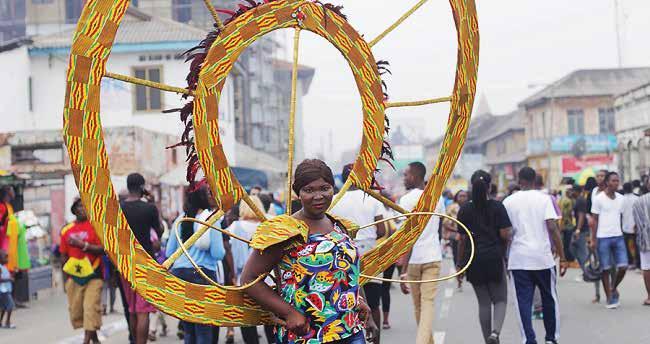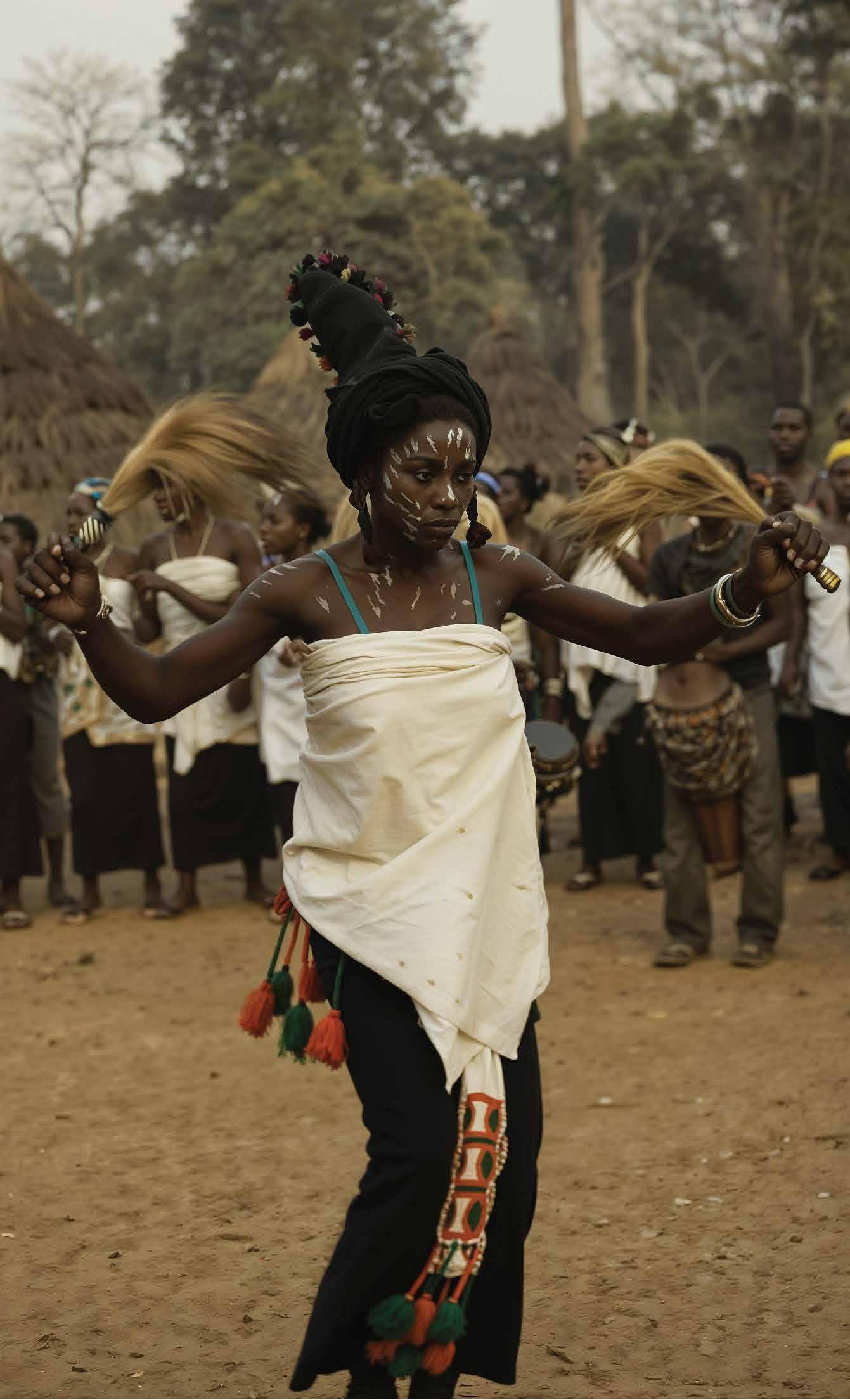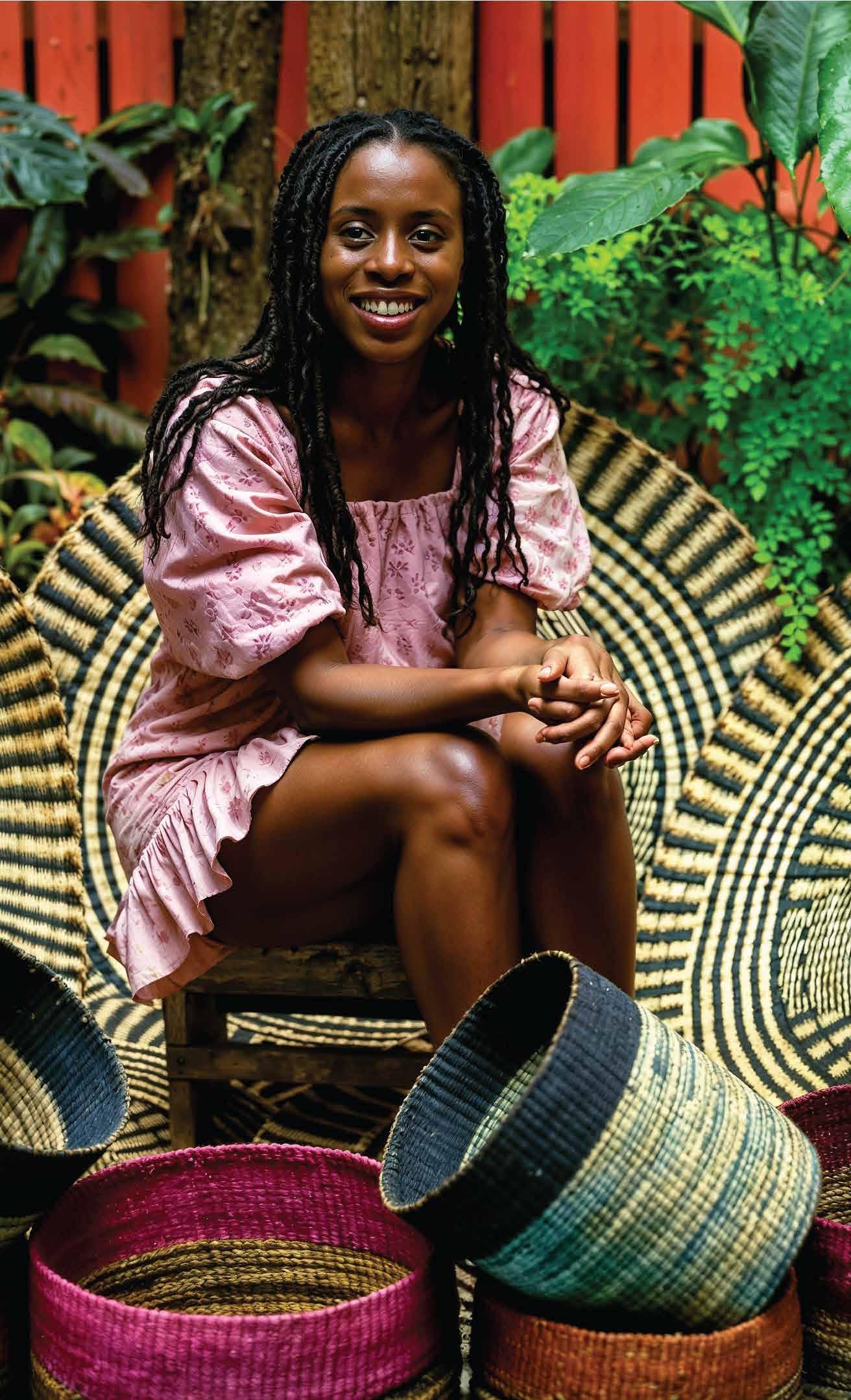

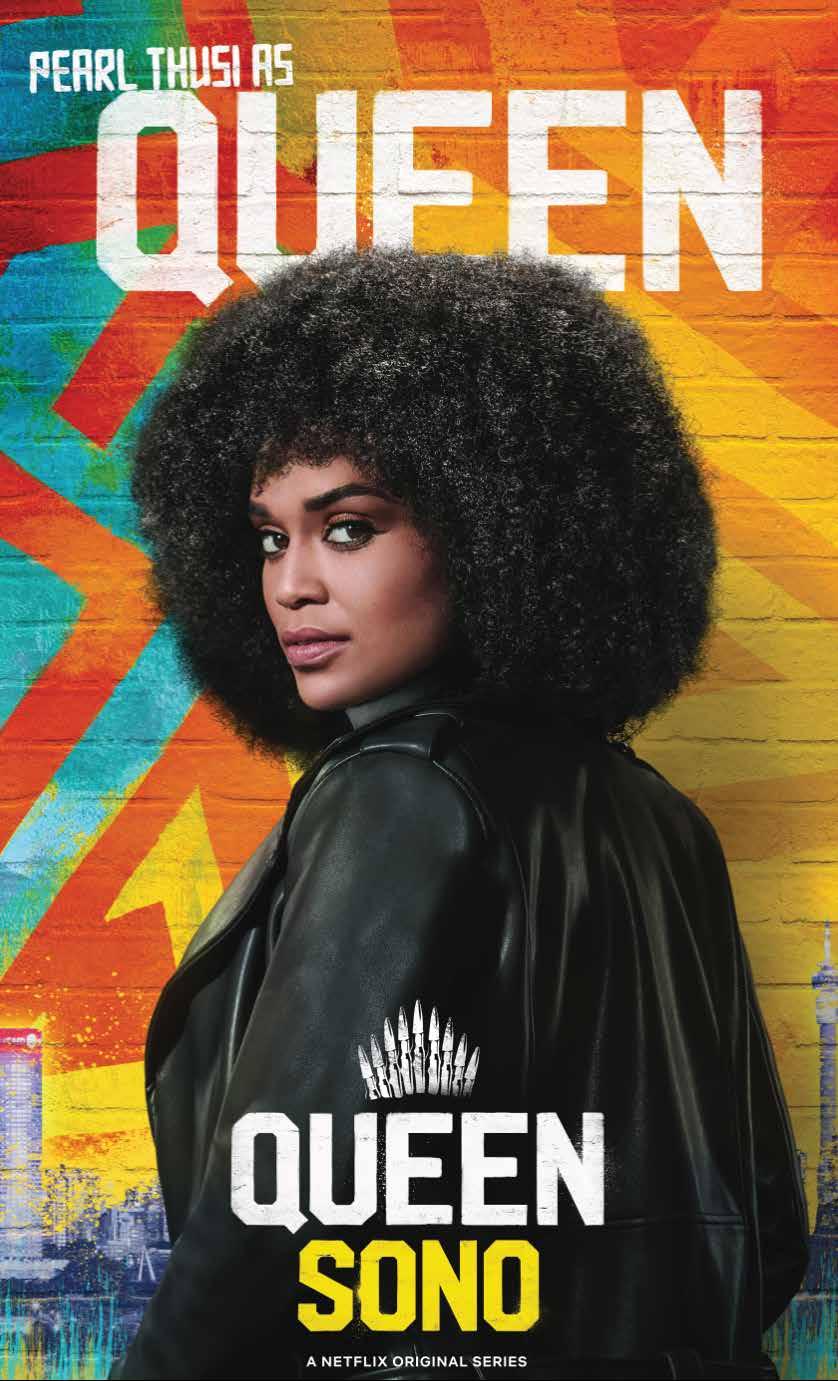




Dear Esteemed Partners and Friends,
This edition holds a special place in our hearts as we shine a spotlight on the unseen and unsung artisans who form the engine of culture in West Africa.
Amidst the bustling markets and serene landscapes exists a group of extraordinary individuals whose artistry and craftsmanship often go unnoticed – our local artisans. These talented individuals, with their skilled hands and creative spirits, breathe life into the culture and stories of our beloved region.
In this edition, you will find stories that highlight the remarkable journeys of these artisans, their dedication to their craft, and the impact they have on our tourism industry. We invite you to explore their world, appreciate the artistry that graces our paths, and join us in celebrating their contributions.
https://landtours.com/
https://landtours.com/
https://landtours.com/

https://landtours.com/
https://landtours.com/
https://landtours.com/
https://www.instagram.com/landtoursgh/ https://www.instagram.com/landtoursgh/ https://www.instagram.com/landtoursgh/ https://www.instagram.com/landtoursgh/ https://www.instagram.com/landtoursgh/ https://www.instagram.com/landtoursgh/ https://www.instagram.com/landtoursgh/ https://www.instagram.com/landtoursgh/ https://www.instagram.com/landtoursgh/ https://www.instagram.com/landtoursgh/ https://www.instagram.com/landtoursgh/ https://www.linkedin.com/company/landtours/ https://www.linkedin.com/company/landtours/ https://www.linkedin.com/company/landtours/ https://www.linkedin.com/company/landtours/ https://www.linkedin.com/company/landtours/ https://www.linkedin.com/company/landtours/ https://www.linkedin.com/company/landtours/ https://www.linkedin.com/company/landtours/ https://www.linkedin.com/company/landtours/ https://www.linkedin.com/company/landtours/ https://www.linkedin.com/company/landtours/ https://www.linkedin.com/company/landtours/ https://www.linkedin.com/company/landtours/
We are excited to share our Panafest 2025 package. The biennial Pan African Festival of Culture in Ghana is the most significant Pan African festival in the world, bringing together Africans and the African diaspora in dialogue about the past, present, and future of Africa through artistic expressions of song, dance, theater, and visual art. Furthermore, it offers a poignant reflection on the trans-Atlantic slave trade. This package is filled with exciting activities, from participating in an atonement ceremony in Salaga, crafted to bridge and unite descendants of the enslaved, to an energetic and invigorating durbar in Elmina. Join us in celebrating Panafest, an embrace of home that creates a catalyst for healing and a celebration of resilience and fortitude.
Our edition also touches on the upcoming vibrant Chale Wote Street Art Festival in August, which for over a decade has seen a culmination of talents from local and international contemporary artists. Under varied yearly themes, the festival transforms the streets of Accra into a living canvas of creative statements and perceptions, conveying diverse interpretations of a singular idea, and serving as a hub for innovation, community, and discovery.
We also take a look at the recently concluded 32nd edition of the St. Louis Jazz Festival in Senegal. St. Louis, once a colonial capital of Senegal, is transformed into a melting pot of jazz melodies, featuring talents from around the world. This May, the streets of St. Louis vibrated with energetic intent as the sounds of jazz and adjacent musical genres filled the air, with over 31 artists performing.
As we continue to celebrate and support the rich culture of West Africa, we are reminded of the power of art and culture in bringing people together and bolstering a sense of community. I hope you find inspiration in the stories and events highlighted in this edition, and I look forward to consequent editions showcasing the very best of West Africa.
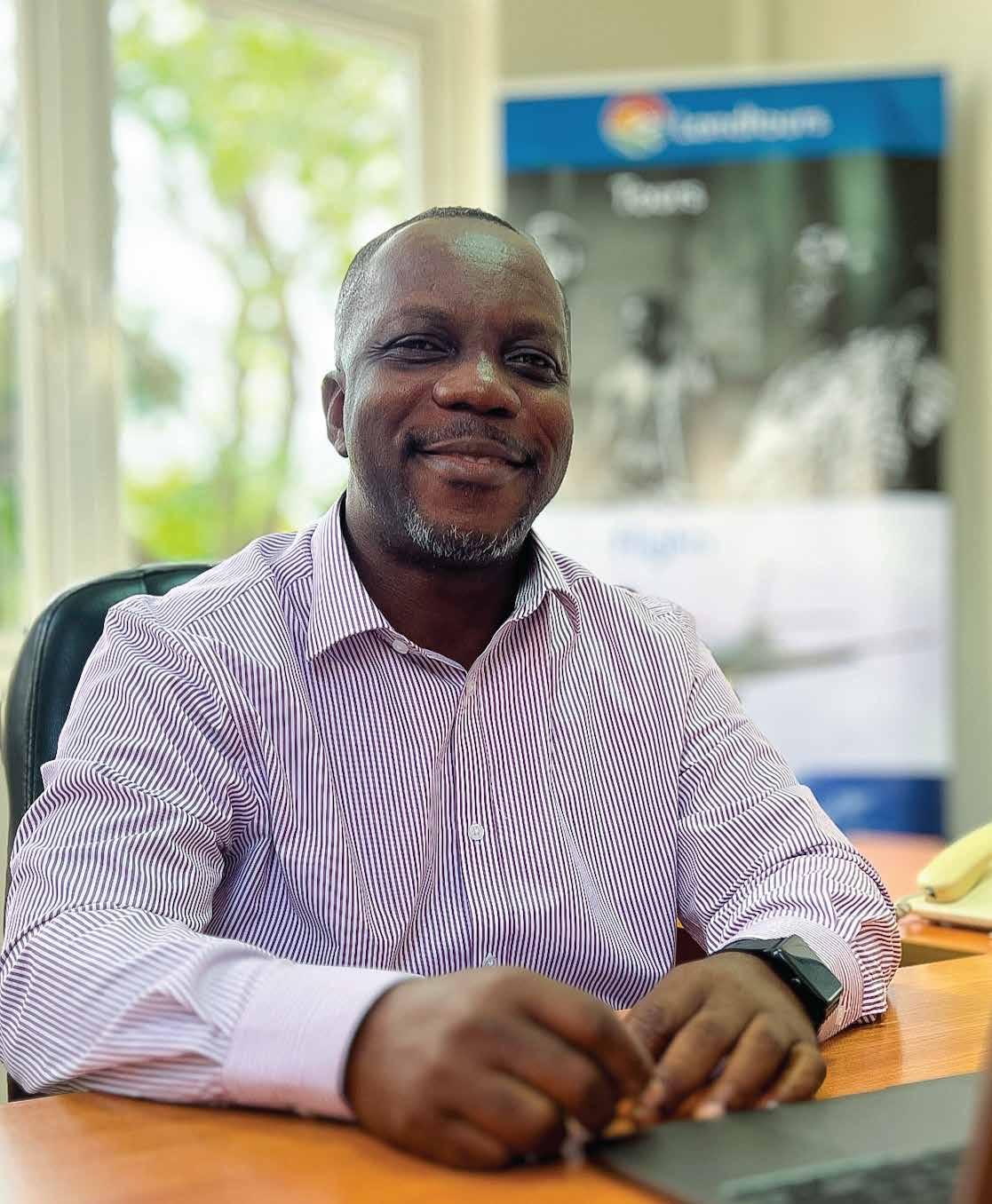

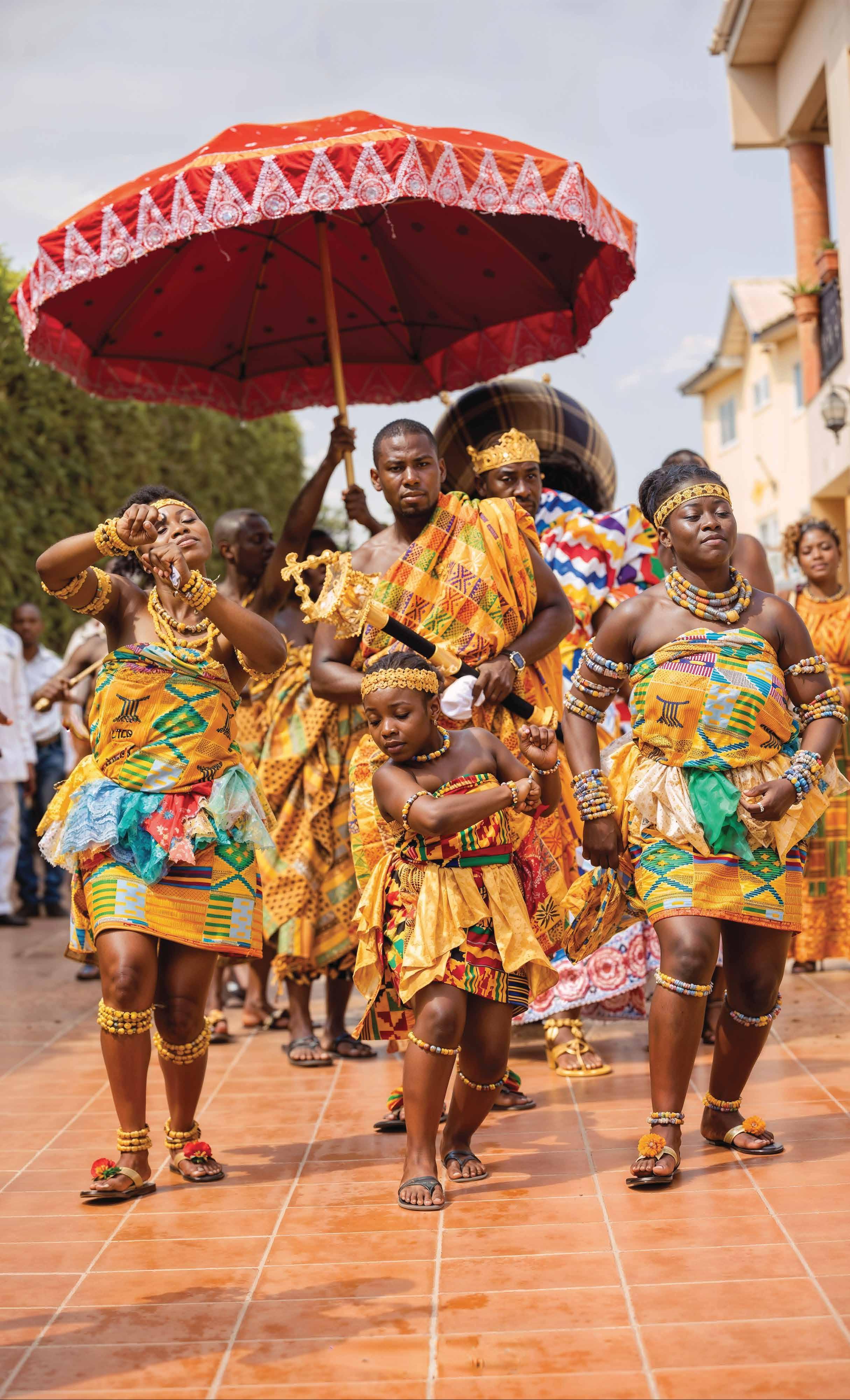
$2,483 per person
double occupancy
single supplement: $850 from


Embark on a profound journey through Ghana's historical and cultural landscapes with our 10-day Pilgrimage, Atonement, and Homecoming Experience. This tour is meticulously designed to provide an immersive experience into the rich heritage, offering opportunities for reflection, cultural connection, and personal growth. A significant experience is the Atonement ceremony where descendants of slave raiders in Salaga, a town in Northern Ghana known for capturing Africans, seek forgiveness from descendants of enslaved Africans through an emotional ceremony. As part of the tour, you will also experience Panafest, a world renowned panAfrican biennial cultural event that promotes and enhances unity among Africans and people of African descent.
Accra City Tour: Explore the vibrant capital, visiting landmarks such as the Independence Square, the Kwame Nkrumah Memorial Park, and a traditional African market.
Salaga Atonement and Naming Ceremony: Participate in a moving atonement ceremony in Salaga, a significant site in the history of the slave trade, followed by a traditional naming ceremony
Kintampo and Kumasi: Discover the haunting history of the slave trade routes at Assin Bono, visit the Kintampo Waterfalls, and explore the Ashanti Kingdom's cultural heritage.
Elmina Castle and Reverential Night: Visit the Elmina Castle, a poignant site in the transatlantic slave trade, and partake in a memorial ceremony and candlelight vigil in commemoration of African ancestors who died in the slave trade.
Emancipation Durbar at Assin Manso: Experience the vibrant Emancipation Day celebrations, featuring a visit to the Assin Manso Ancestral Slave River, the final transit point for enslaved Africans, a grand durbar of traditional chiefs and a colorful display of Ghanaian culture.

Cultural Immersion: Engage deeply with Ghanaian culture through interactions with local communities, traditional ceremonies, and historical site visits.
Historical Significance: The tour provides a comprehensive exploration of Ghana's role in the transatlantic slave trade, fostering a deeper understanding of this critical period in history.
Personal Connection: The atonement and naming ceremonies offer a unique opportunity for personal reflection and connection to African heritage.
Expert Guidance: Led by experienced guides, the tour ensures insightful narratives and a seamless travel experience.
Comfort and Convenience: Stay in carefully selected 3 to 5-star hotels, travel in air-conditioned vehicles, and enjoy a balance of guided activities and leisure time.
-Accommodation in 3 to 5-star hotels
-Daily breakfast, 2 lunches, and 7 dinners
-All entry fees as per itinerary
-Professional tour guide and licensed chauffeur
-Air-conditioned transportation
-International flights
-Meals not specified in the itinerary
-Personal expenses
-Gratuities
-Travel insurance and COVID-19 related expenses
8
july 2024 | issue #6
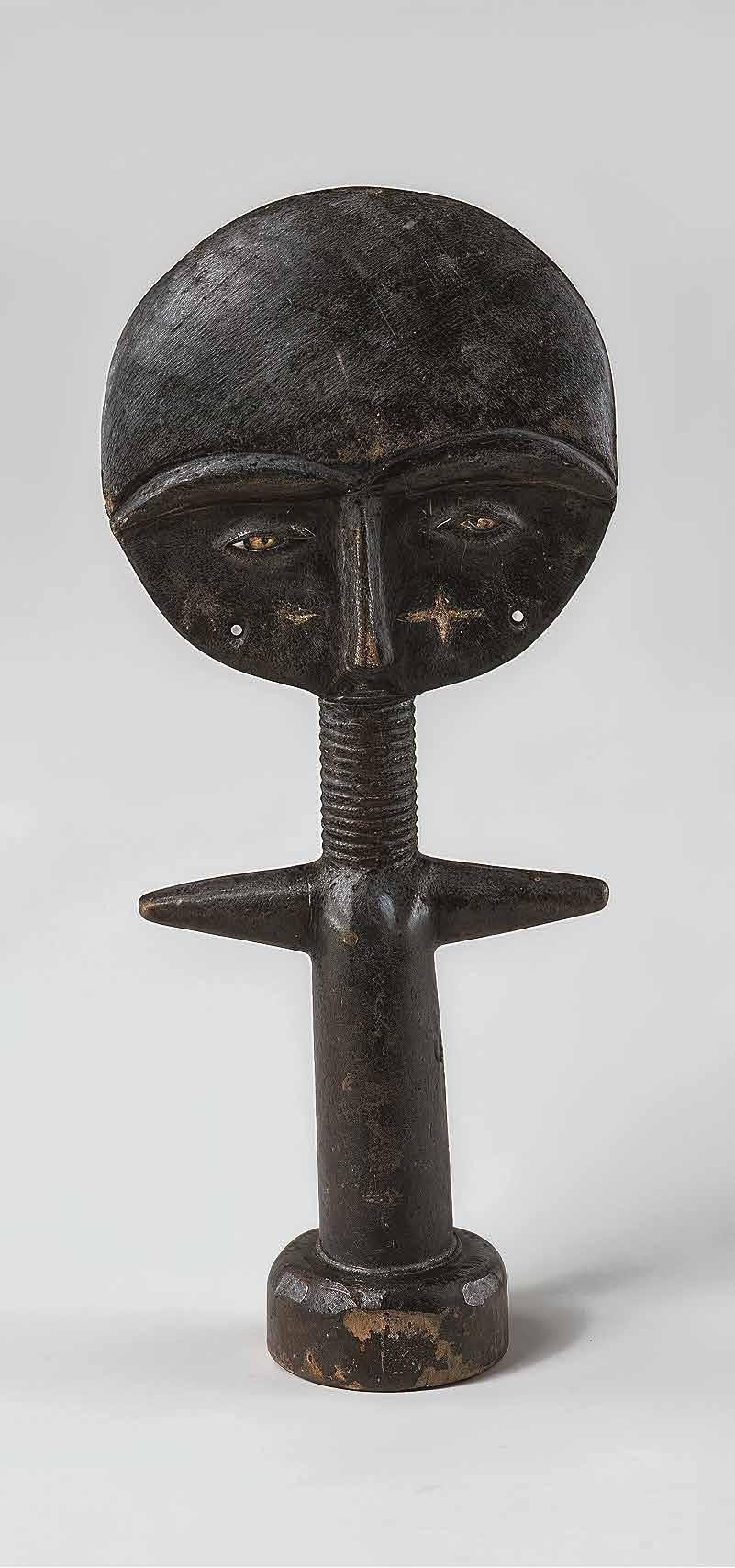
8 the unsung & unseen cultural artisans
Within West Africa, cultures brim with intricate traditions, welcoming locals, and stunning landscapes. These elements are visually exemplified and symbolized in locally handcrafted expressions of West African culture's essence.
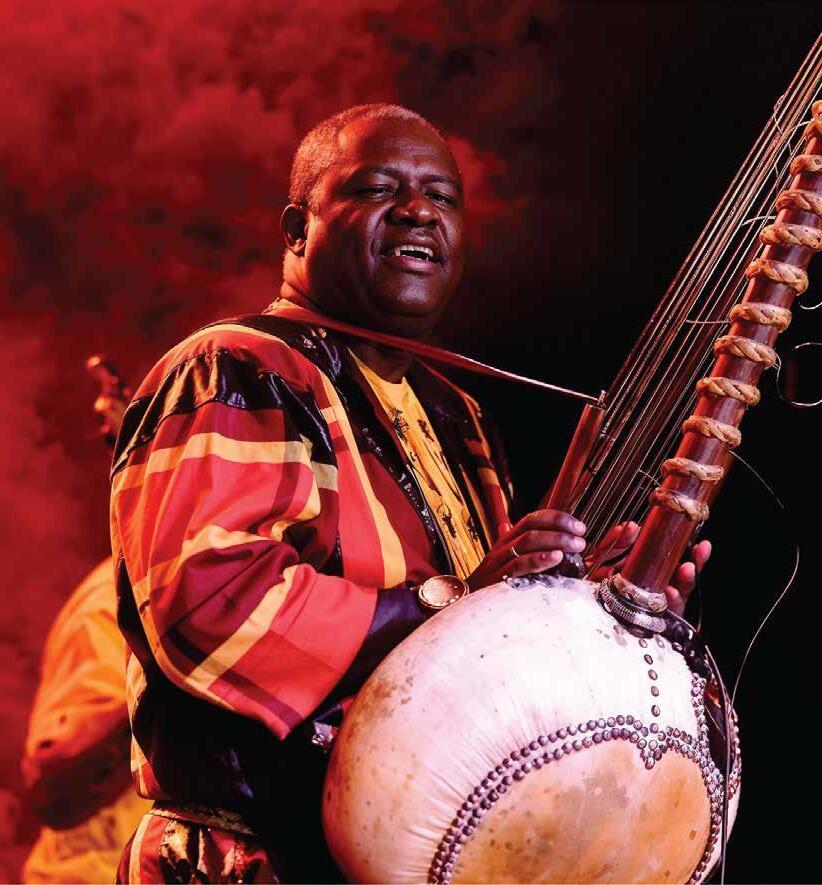
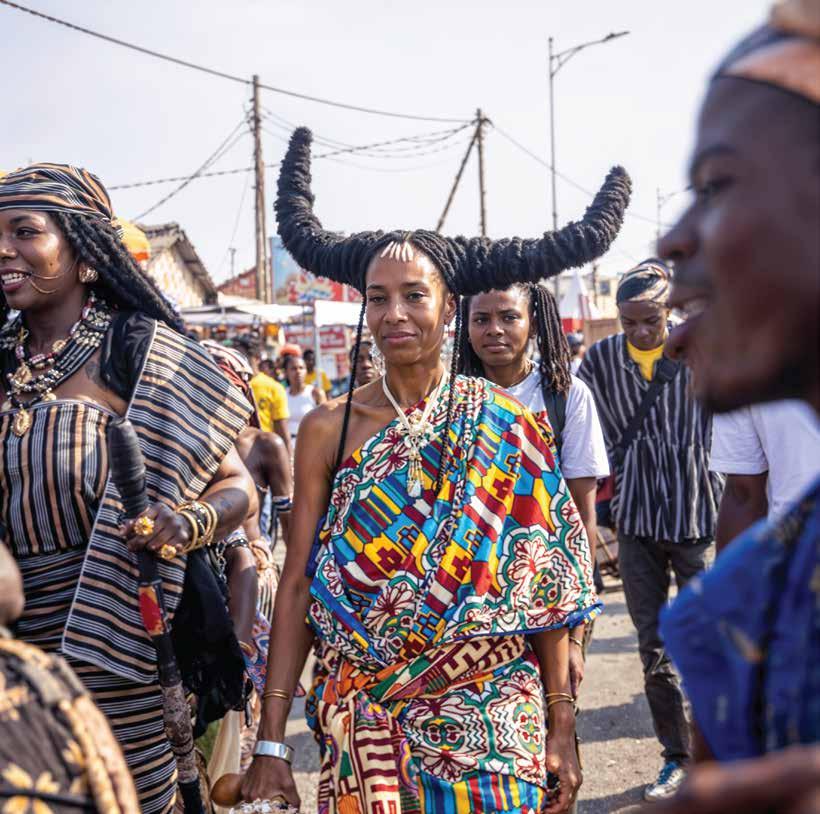
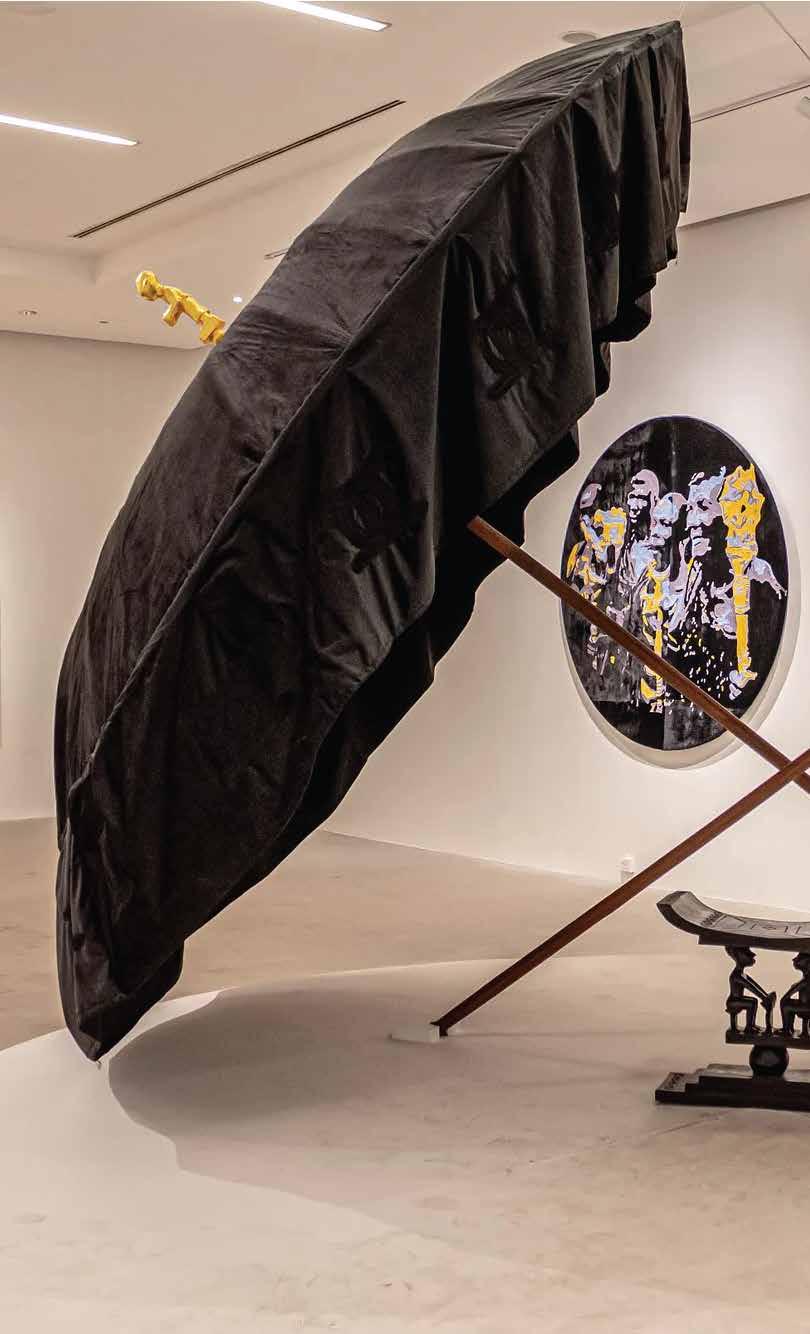
Within West Africa, cultures brim with intricate traditions, welcoming locals, and stunning landscapes. These elements are visually exemplified and symbolized in locally handcrafted expressions of West African culture's essence.
Culture is the thread that weaves together each community within the sub-region, attaching profound meaning to what is held dear. Across different West African countries, individuals and organizations are committed to preserving cultural essence through artistic expressions. However, their contributions to the tourism value chain may often go unseen and under-appreciated.
Our commitment to showcasing the authentic and traditionally vibrant aspects of West Africa drives us to tell a few of these stories and highlight the immense contributions made to ensure traditions and skills are passed down through generations.
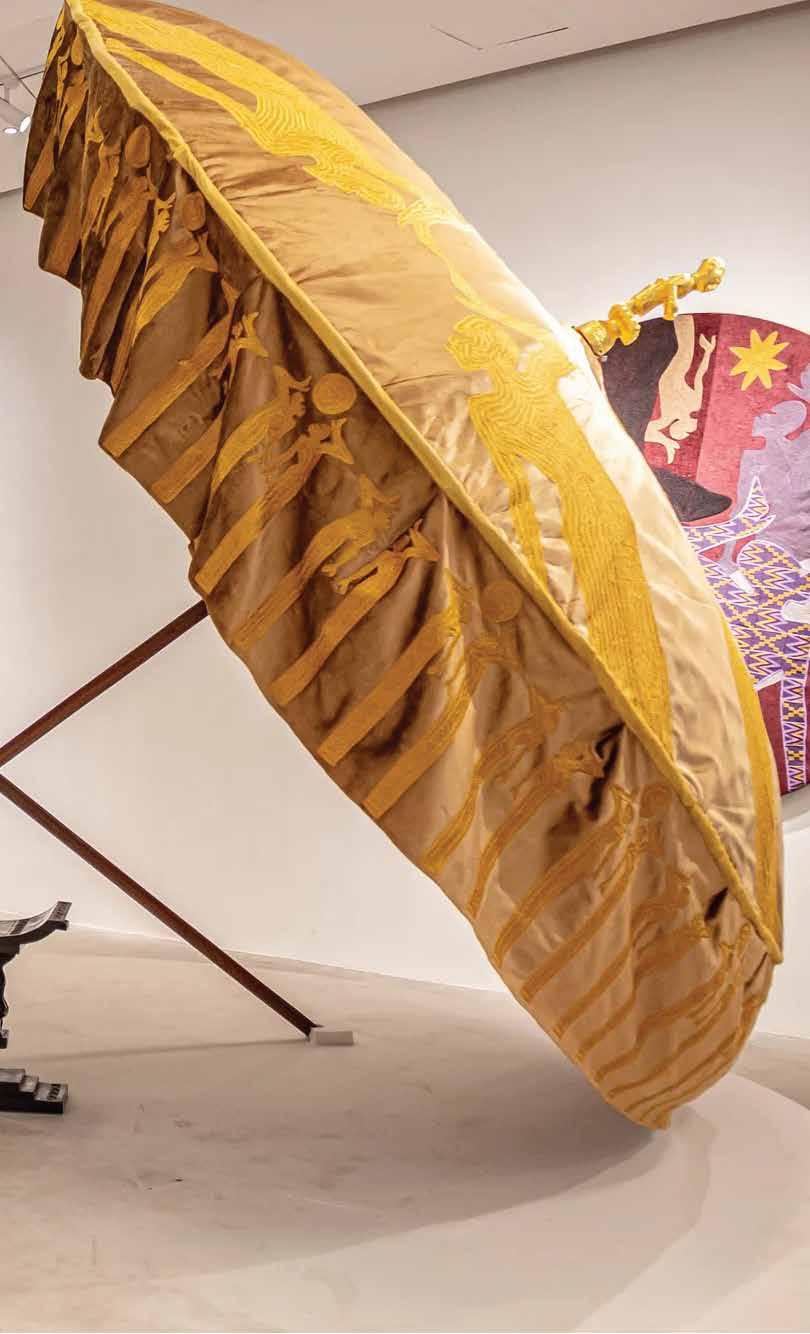
One cannot simply recount stories of cultural artisans without mentioning the Asante Kingdom in Ghana. This is a treasure trove for discovering artisans, with the Adinkra and Kente cloth as well as the wood carvers of the Ahwiaa villages often in the limelight. However, the Royal Umbrella makers are a gem often overlooked. The Royal Umbrellas, typically used during ceremonies and durbars within the Asante Kingdom, have the largest one reserved for the Asantehene, the head of the Asante Kingdom, if he is in attendance.
Rita Mawena Benissan, founder of the Si Hene Foundation, a not-for-profit organization dedicated to archiving and preserving Ghanaian chieftaincy and traditional culture, showcased the work of these incredible artisans in an exhibition at Gallery 1957 in Accra.
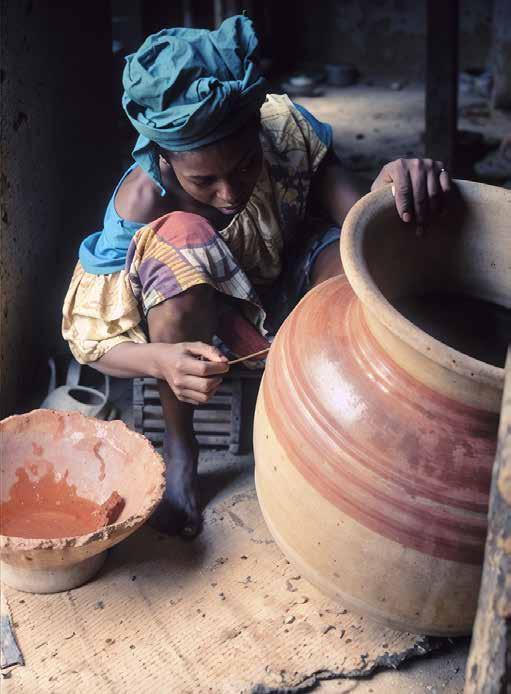
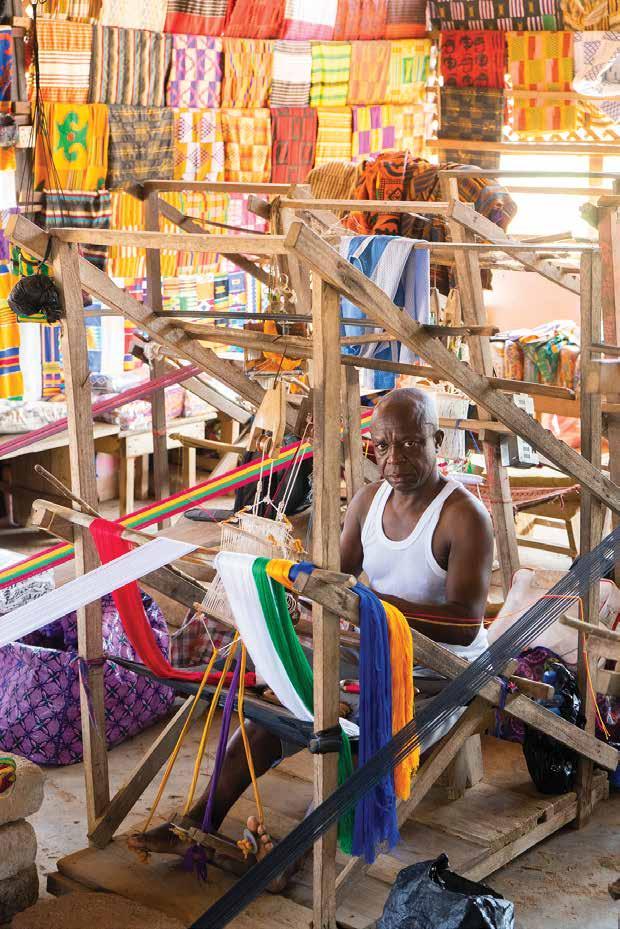
The Royal Umbrellas not only shield the king from weather conditions but also indicate personality traits of the chief or king, tell the audience the royal family/house of the noble, or symbolize specific proverbs or subliminal messages. The Sewua area in the Ashanti region is renowned for producing royal umbrellas and the artisans here hand down this skill through generations.
In Katiola, a town in Yamoussoukro, Côte d’Ivoire, the Mangoro women keep their cultural heritage alive through pottery. The women of this community have also evolved with the times with cooperatives formed, with the assistance of various donor agencies, to organize, structure, train, and ensure that the Mangoro women are fairly paid and equipped with essential skills.
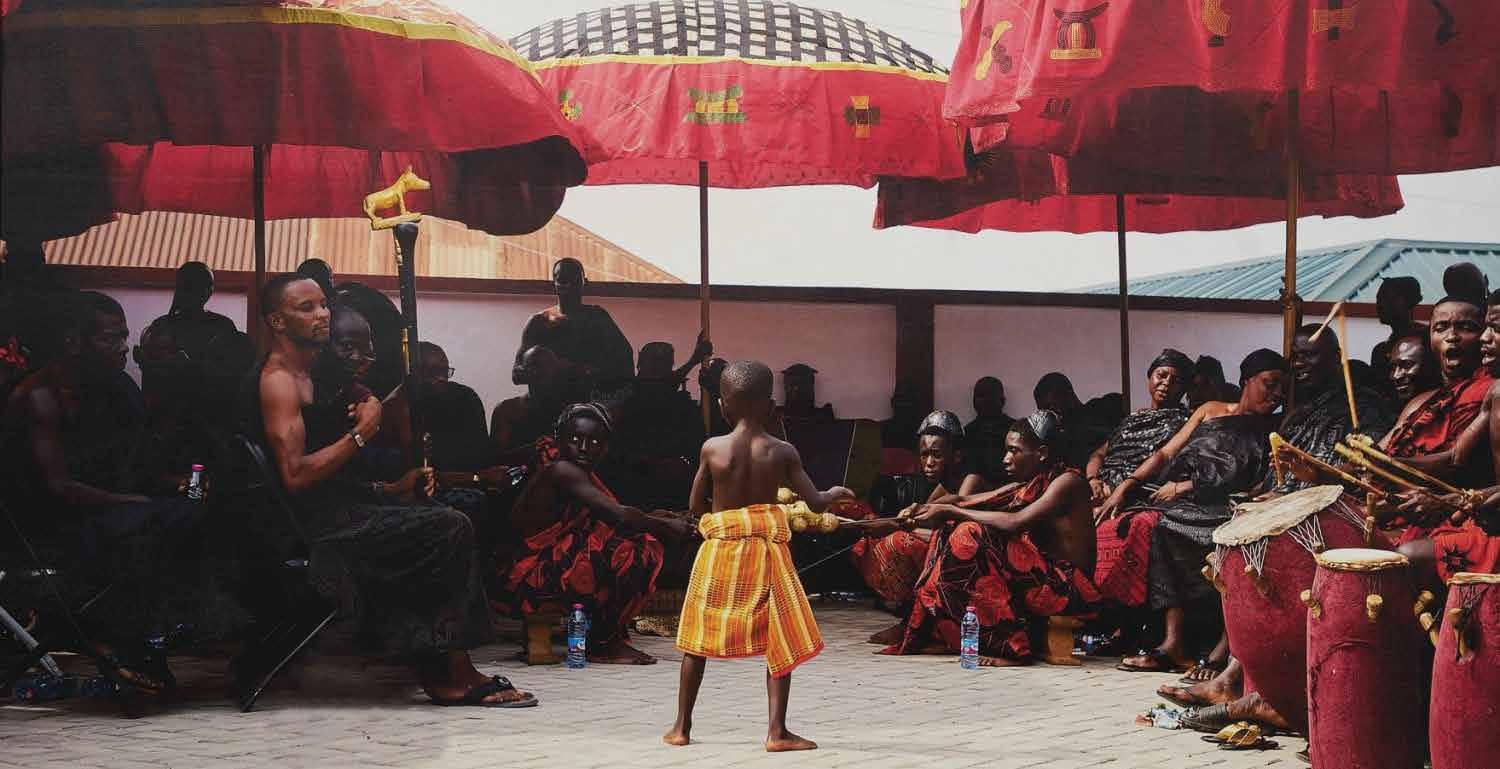
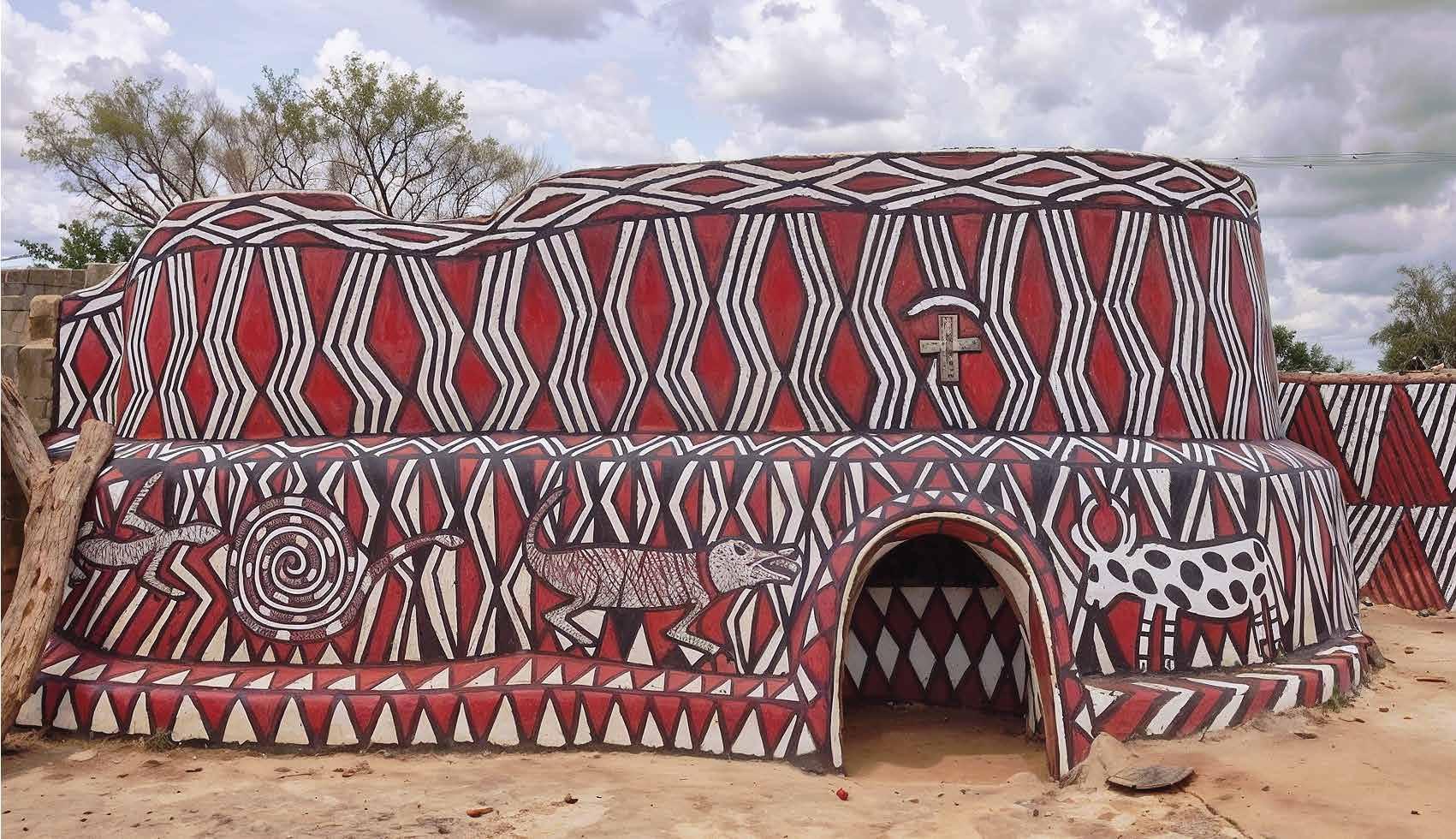
The art of pottery is deeply rooted in tradition, and the pieces crafted by the Mangoro women tell stories steeped in history and heritage. Historically, only women were allowed to mine the clay used, and this was restricted to certain days as the locals believe that the departed were the providers of the precious clay.
The Sirigu community in the Upper East Region of Ghana has gained international recognition for its exceptional pottery and vibrant murals, thanks to the dedicated efforts of the Sirigu Women's Organization for Pottery and Art (SWOPA). This remarkable organization holds significance not just as a collective of women but also as a cultural reservoir, a women's economic upliftment group, and a social empowerment movement.
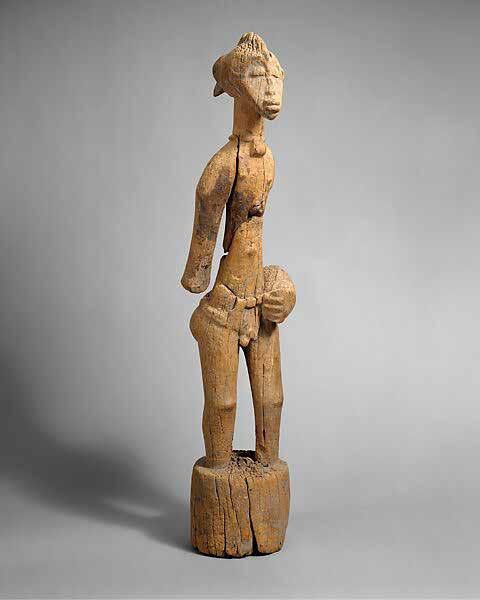
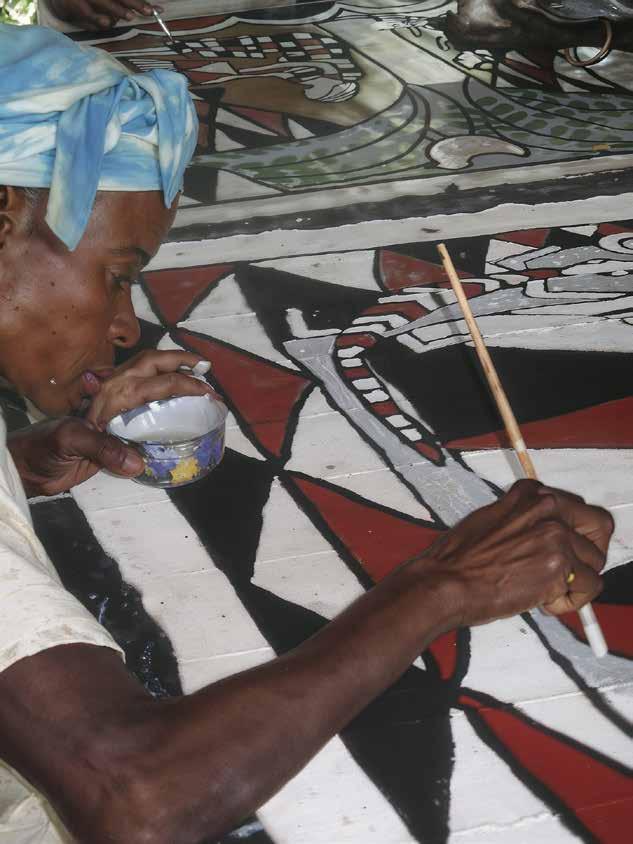
Founded in 1997 by a group of visionary women, SWOPA was established to revive and sustain the traditional crafts of the Sirigu people. These artistic practices are deeply ingrained in the social and cultural fabric of the community. The organization emerged from the recognition that the artistic heritage of the region was at risk of being lost due to modernization and the economic challenges faced by local artisans.
The Senufo people in Northern Ivory Coast have a long-standing tradition of wood carving that dates back centuries. This art form is deeply embedded in their cultural and religious practices. Senufo wood carvers, known as "Kulebele," are highly respected within their communities and are often initiated into the craft
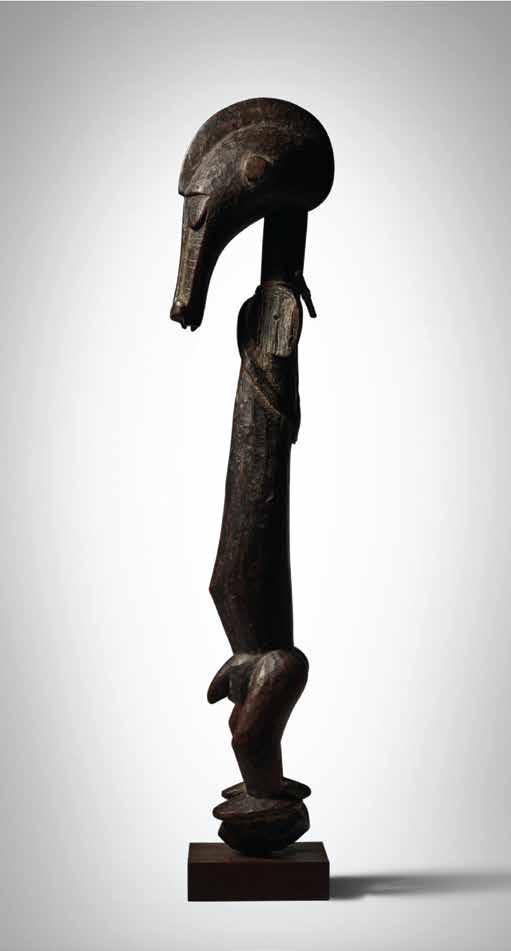
through an in-depth apprenticeship, where they learn the skills and spiritual knowledge necessary to create their intricate works.
Senufo wood carvers work primarily with locally sourced wood, such as the hard and durable Iroko and Sipo woods. The process begins with the careful selection of the wood, which is believed to hold spiritual significance. The carvers then use a variety of hand tools, including chisels, knives, and gouges, to bring their visions to life.
The carvings are characterized by their detailed and stylized features. Senufo sculptures often depict human figures, animals, and mythical beings, each inspired by symbolic meaning. These works serve as important cultural artifacts used in rituals, ceremonies, and as objects of reverence.
Today, Senufo wood carvings are highly sought after by collectors and art enthusiasts worldwide. Museums and galleries, such as the Smithsonian, showcase these works as examples of African art, recognizing their historical and aesthetic value. Despite the increasing demand, many Senufo carvers remain committed to traditional methods and continue to create pieces that honor their heritage.
These examples barely cover the full extent of the diverse array of traditional artisans keeping the stories and cultures of West Africa alive, regardless, the essence of how their contributions lend to the pieces of what truly makes the sub-region cannot go under-stated. As a company dedicated to ensuring the fires of West African culture remain as bright as ever, we take pride in highlighting our unseen and unsung cultural artisanal heroes and seek to ensure that their value is recognized and celebrated.
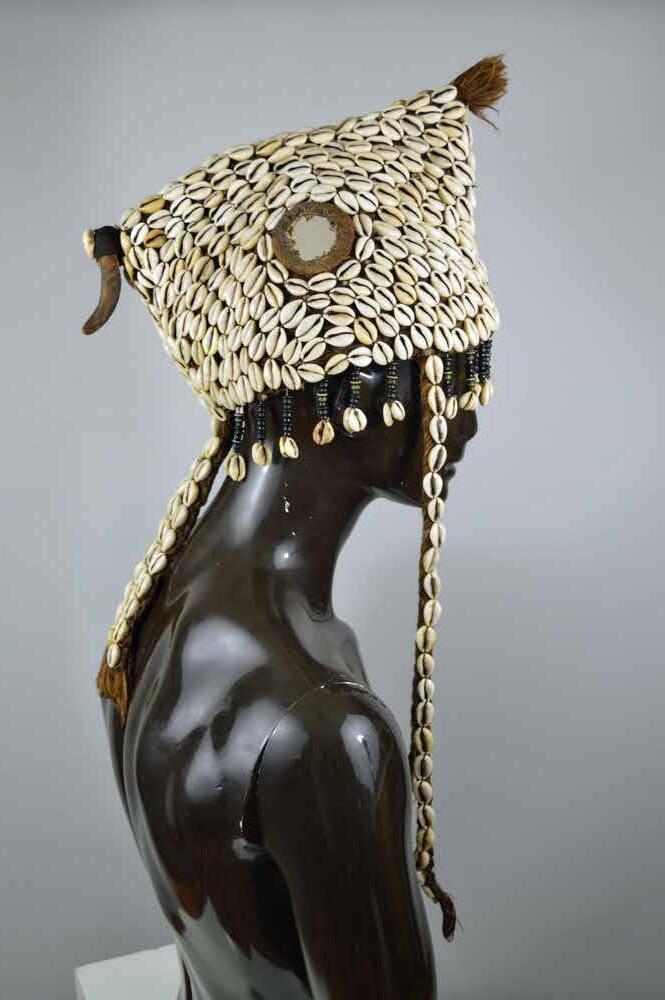
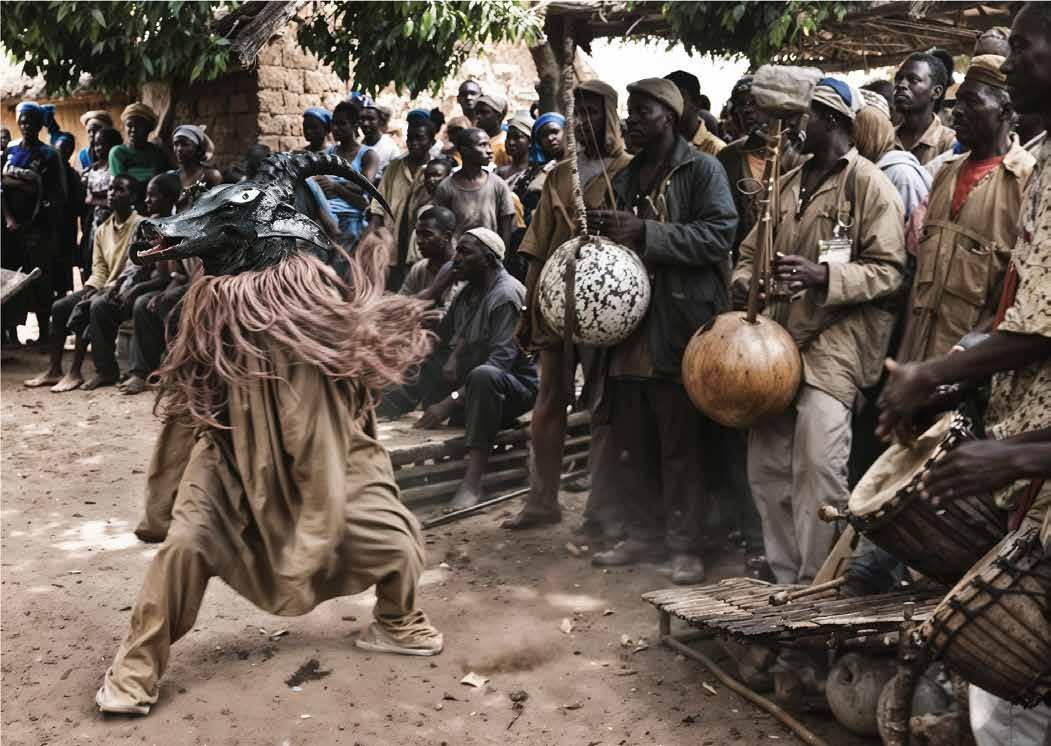
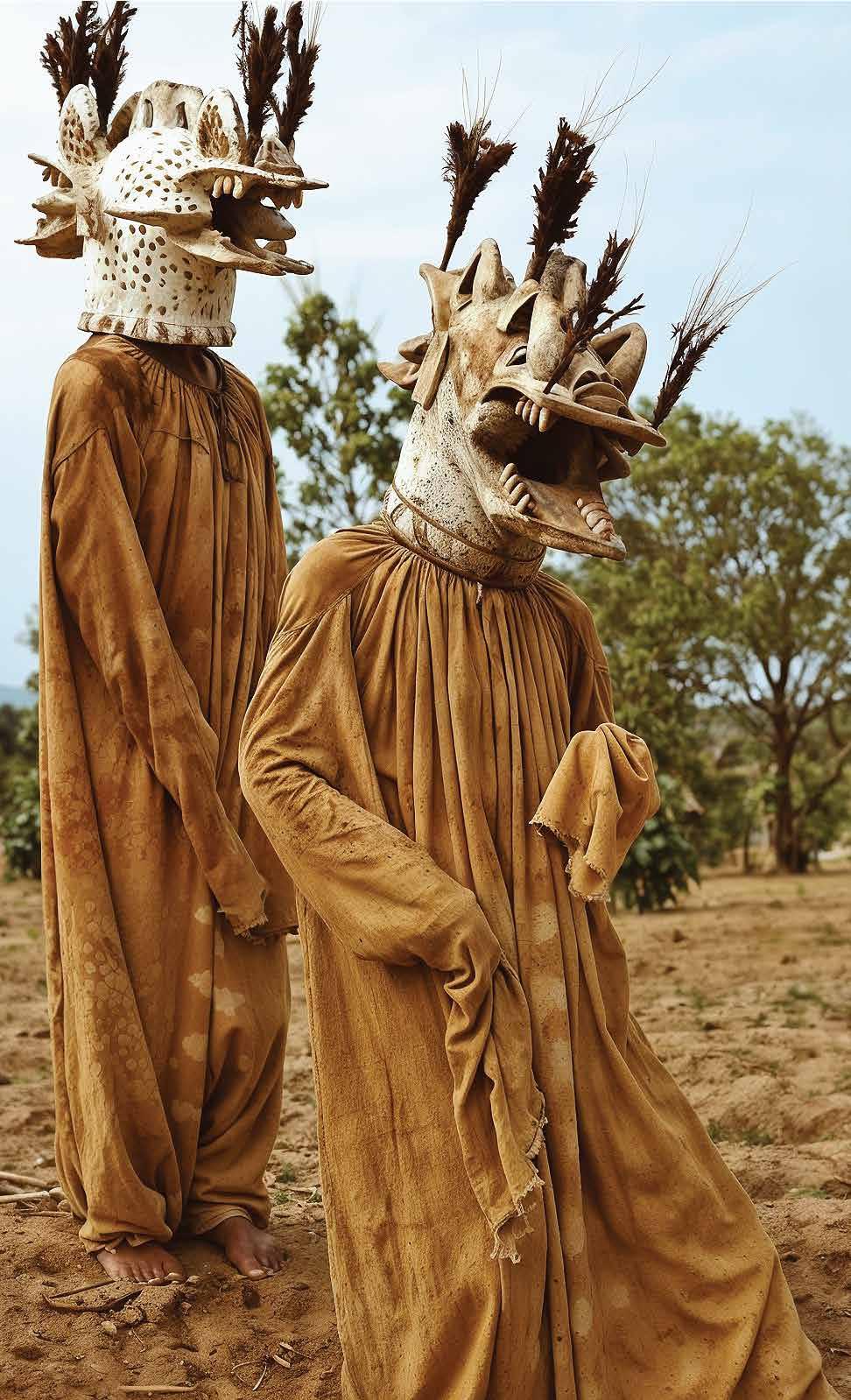

The historic city of Saint Louis became a buzzing hub of music and culture as the 32nd edition of the Saint Louis Jazz Festival took place from the 16th to the 20th of May. This event, renowned as one of the most significant jazz festivals in Africa, brought together musicians, such as Denise King, Raphael Pannier, Carmen Souza and other musical talents from around the world to celebrate the universal language of jazz.
Saint Louis, a UNESCO World Heritage site, provides a charming setting for the festival. The city's colonial architecture, narrow streets, and vibrant cultural heritage create a unique atmosphere that enhances the musical experience. Founded in 1992, the Saint Louis Jazz Festival has grown exponentially, evolving from a small local gathering into an international event that showcases the diversity and dynamism of jazz music.
One of the defining features of the Saint Louis Jazz Festival is its ability to attract a diverse lineup of performers. International jazz legends share the stage with emerging African artists, creating a harmony of sound that bridges continents and cultures. The festival has hosted renowned artists such as Herbie Hancock, Joe Zawinul, and Randy Weston, alongside talented African musicians like Cheikh Lô, Baba Maal, and the late Manu Dibango.
The festival typically spans a week, during which the city of Saint Louis vibrates with the sounds of jazz, a genre of music which is a testament of Africa’s influences on North American and Afro-caribbean music. The event's alluring sounds and nightly concerts draw large crowds that bask in the captivating sounds of the eclectic melodies. In addition to the main performances, the festival includes workshops, jam sessions, and masterclasses, providing opportunities for musicians to learn from each other and for audiences to engage more deeply with the music and the Senegalese culture.
At its core, the Saint Louis Jazz Festival is a celebration of unity and diversity. It brings together people from different backgrounds, cultures, and generations, all united by a shared love of music. The festival exemplifies the power of jazz to transcend boundaries and connect people on a profound emotional level.
As the Saint Louis Jazz Festival continues to grow, it remains committed to its mission of promoting jazz. Like previous editions, this year's edition of the festival celebrated incredible talents which fostered enriching experiences, solidifying Saint Louis's reputation as a global jazz destination.
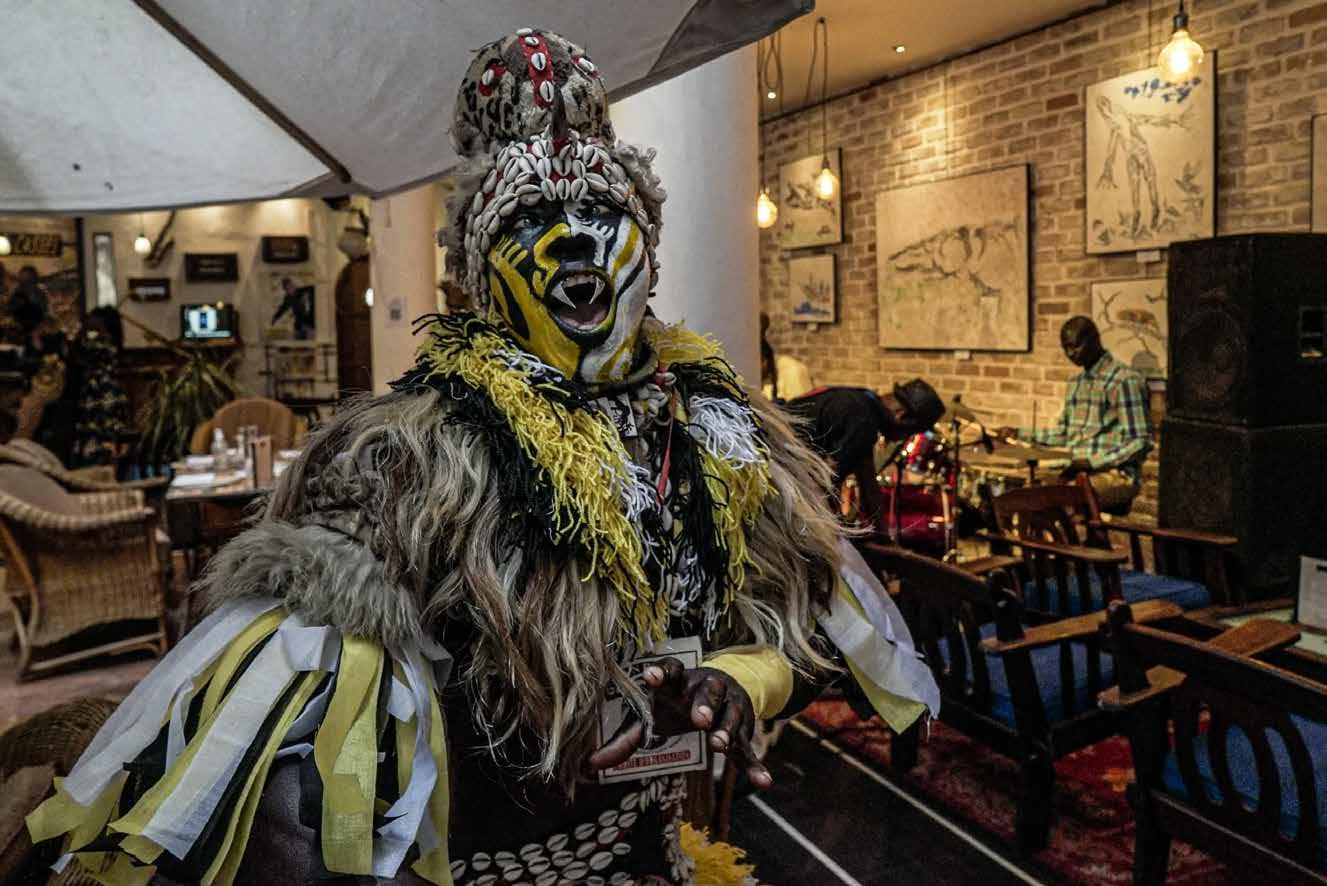
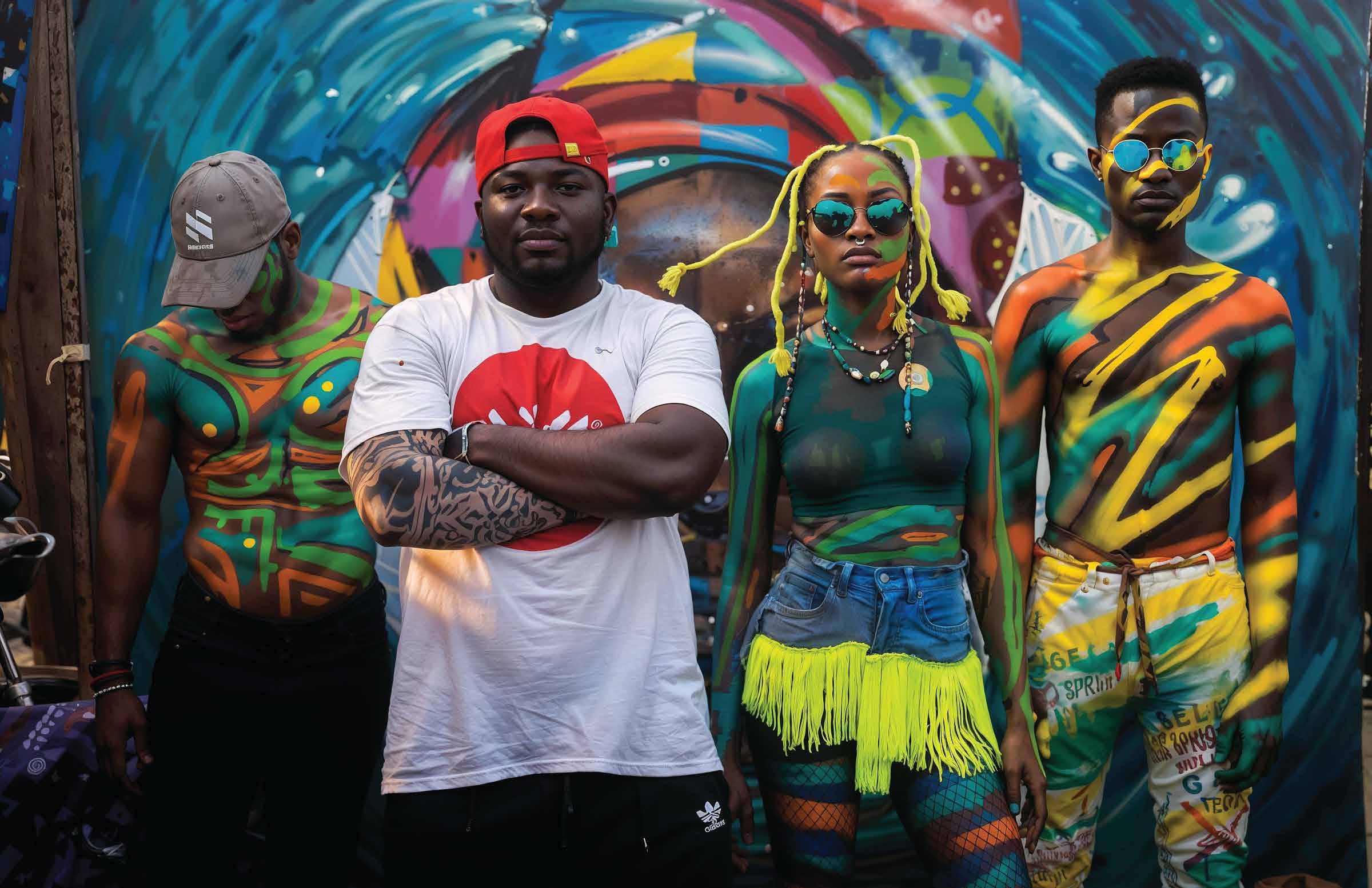
Every year, the streets of Jamestown, one of Accra's oldest neighborhoods, come alive with an explosion of art, music, dance, and cultural expression during the Chale Wote Street Art Festival and this year is no different. From the 19th to 25th of August, the streets of Accra will be painted with artistic expressions of the theme, “And now an end to the empire of horrors” with a convergence at the historic Osu castle.
Since its inception in 2011, Chale Wote has grown into one of West Africa's most anticipated and celebrated festivals, drawing artists, performers, and visitors from all over the world.
Chale Wote, which means "Friend, Let's Go" in Ga, the local language, began as a grassroots initiative aimed at breaking creative boundaries and bringing art to the public space. Organized by Accra [dot] Alt, a cultural network promoting alternative art and culture, the festival seeks to reimagine public space and engage community participation through art.
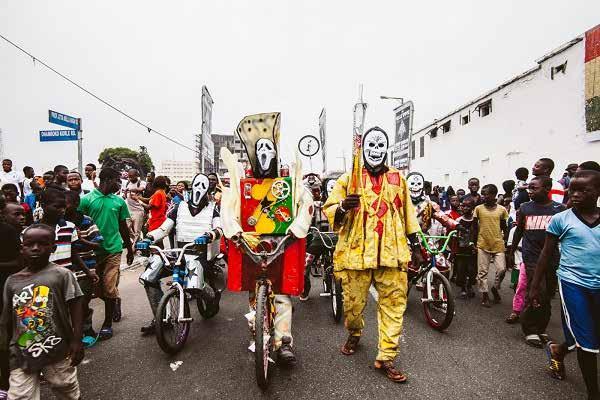
It offers a platform for artists to showcase their work, collaborate, and connect with audiences from across the world.
The festival not only displays beautiful expressive artwork from both traditional and contemporary artists, it takes a critical look at the influence of culture on artistic expressions.
The vibrant energy and cosmopolitan atmosphere of Accra, the capital city of Ghana, attracts artists and visitors from all corners of the globe, making it a melting pot of creativity and cultural exchange.
The Chale Wote festival draws inspiration from these cultural elements, incorporating traditional performances, rituals, and symbols into its programming. This fusion of traditional and contemporary art forms not only honors the heritage of tribes within but also creates a unique and captivating festival experience.

One of the festival's highlights is the street parade, featuring masquerades, stilt walkers, and drummers, reflecting the rich cultural heritage of Ghana and the broader African continent.
Traditional dances and rituals are seamlessly woven into contemporary artistic expressions, creating a dynamic fusion of the past, present and sometimes future.
Chale Wote festival has over the years provided a unique platform for both local and international artists to showcase their talents. The festival encourages artistic collaboration and cross-cultural exchange by incorporating a yearly theme geared towards creating a sense of global community through differing expressions of a singular theme. Artists from various backgrounds come together to create and share their work, enriching the festival with diverse perspectives and creative energies.
Beyond the art and festivities, Chale Wote is deeply rooted in community engagement and social activism. The festival addresses social issues such as environmental sustainability, gender equality, and youth empowerment through workshops, panel discussions, and interactive sessions. By involving the local community in the planning and execution of the festival, Chale Wote continues to promote a sense of ownership and pride among all stakeholders.
As Chale Wote continues to evolve and expand, its commitment to celebrating creativity, nurturing community, and addressing social issues remains resolute. The festival's inclusive and collaborative spirit ensures that it will continue to be a powerful catalyst for artistic expression and cultural dialogue in Ghana and beyond.
